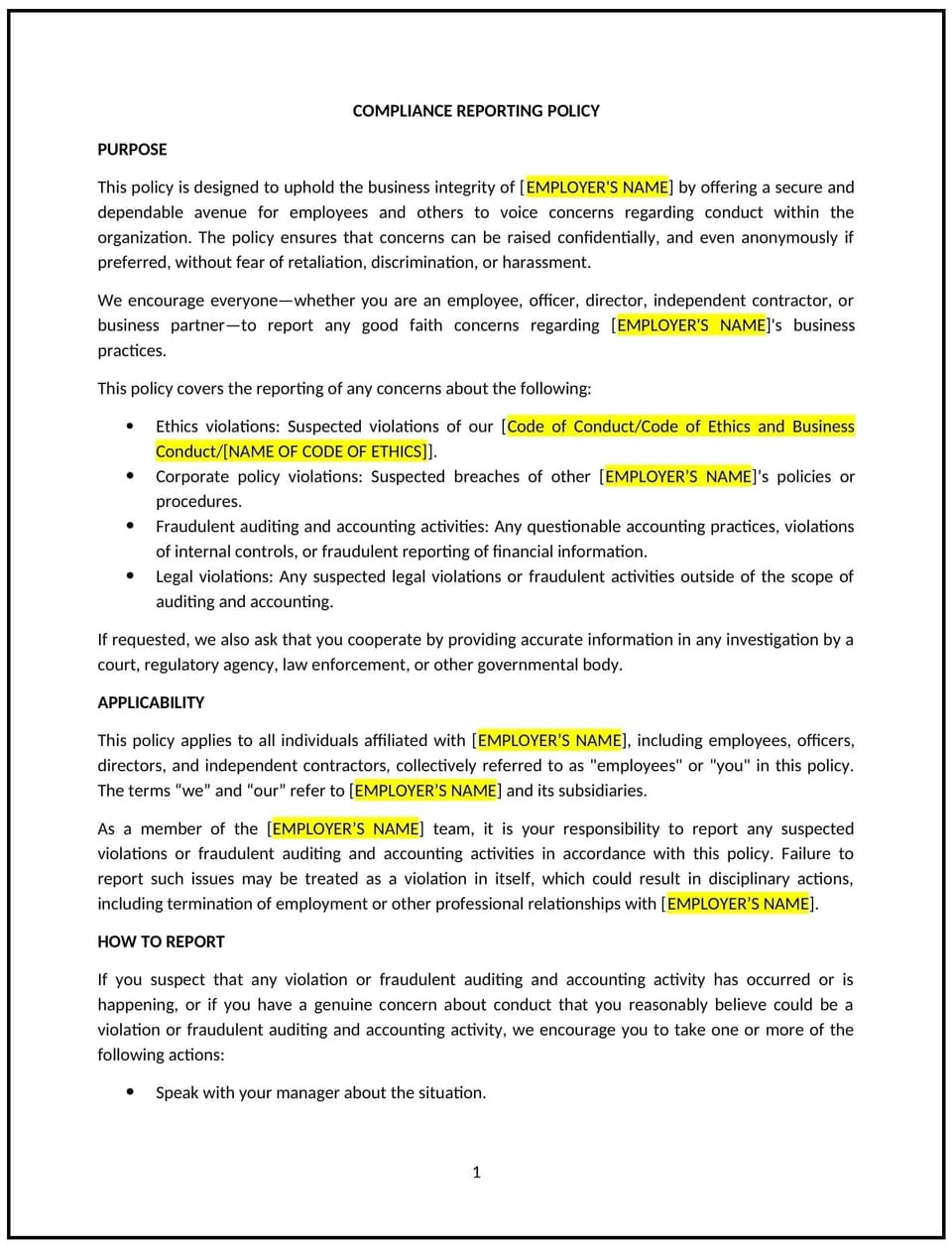Compliance reporting policy (Iowa): Free template

Compliance reporting policy (Iowa)
A compliance reporting policy helps Iowa businesses establish a structured approach for employees to report concerns related to legal, regulatory, and ethical issues within the workplace. By providing clear reporting channels and protections, businesses can encourage transparency, prevent misconduct, and address risks before they escalate.
This policy outlines reporting procedures, confidentiality protections, and investigation processes. It helps businesses promote accountability while ensuring employees feel secure when raising concerns about workplace practices.
By implementing this policy, businesses in Iowa can foster a culture of integrity, reduce risks associated with non-compliance, and support ethical business operations.
How to use this compliance reporting policy (Iowa)
- Define reportable issues: Clarify which types of concerns employees should report, including legal violations, workplace misconduct, or unethical behavior.
- Establish reporting channels: Provide employees with multiple options for reporting concerns, such as direct supervisors, HR representatives, or anonymous hotlines.
- Outline confidentiality protections: Assure employees that reports will be handled discreetly and that their identities will be protected when possible.
- Prohibit retaliation: Communicate that employees who report concerns in good faith will not face retaliation.
- Set investigation procedures: Define how compliance concerns will be reviewed, including timelines, responsible personnel, and follow-up actions.
- Require documentation: Establish guidelines for recording and tracking compliance reports to ensure consistent handling.
- Train employees and managers: Provide education on recognizing compliance risks and properly responding to concerns.
- Review and update: Regularly assess the policy to reflect changes in Iowa regulations and workplace needs.
Benefits of using this compliance reporting policy (Iowa)
This policy offers several advantages for Iowa businesses:
- Encourages ethical business practices: Promotes transparency and accountability.
- Reduces legal and financial risks: Helps businesses address potential violations before they become serious issues.
- Protects employees: Provides a secure process for reporting concerns without fear of retaliation.
- Strengthens business reputation: Demonstrates a commitment to integrity and responsible operations.
- Improves workplace culture: Fosters trust by encouraging open communication.
- Supports regulatory adherence: Helps businesses stay aligned with applicable laws and industry standards.
Tips for using this compliance reporting policy (Iowa)
- Provide multiple reporting options: Businesses should offer various channels, such as anonymous reporting hotlines, to accommodate employee concerns.
- Communicate non-retaliation commitments: Businesses should assure employees that they are protected when making reports in good faith.
- Train employees on reporting procedures: Businesses should educate staff on recognizing compliance issues and how to report them properly.
- Document all reports: Businesses should maintain detailed records of reported concerns and follow-up actions for accountability.
- Conduct prompt investigations: Businesses should establish a structured process for reviewing compliance reports and taking corrective action.
- Review policy effectiveness: Businesses should periodically assess whether the reporting process is accessible and effective.
Q: Why should Iowa businesses implement a compliance reporting policy?
A: Businesses should establish this policy to promote ethical workplace practices, prevent misconduct, and create a structured process for handling compliance concerns.
Q: What types of issues should employees report?
A: Businesses should encourage reporting of legal violations, fraud, discrimination, workplace harassment, safety concerns, and unethical behavior.
Q: How can businesses encourage employees to report compliance concerns?
A: Businesses should create a safe reporting environment, offer multiple reporting options, and reassure employees that retaliation will not be tolerated.
Q: Who should handle compliance reports within a business?
A: Businesses should designate HR personnel, compliance officers, or leadership teams to review reports and oversee investigations.
Q: Can businesses allow anonymous reporting?
A: Yes, businesses should provide anonymous reporting options to encourage employees to come forward without fear of exposure.
Q: What should businesses do after receiving a compliance report?
A: Businesses should document the report, conduct a fair investigation, and take appropriate corrective action.
Q: How often should businesses review their compliance reporting policy?
A: Businesses should reassess the policy annually or as legal and regulatory requirements change.
Q: What role do managers play in compliance reporting?
A: Businesses should train managers to recognize compliance issues, support employees who report concerns, and escalate reports appropriately.
This article contains general legal information and does not contain legal advice. Cobrief is not a law firm or a substitute for an attorney or law firm. The law is complex and changes often. For legal advice, please ask a lawyer.


